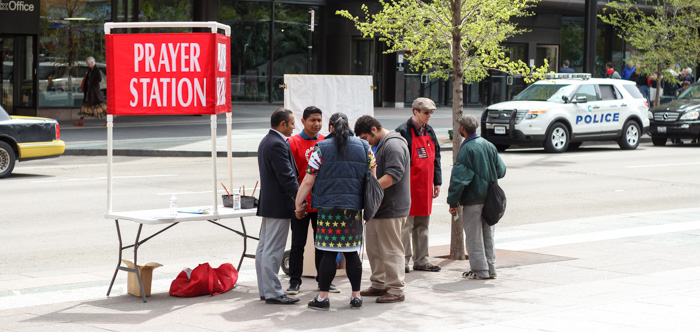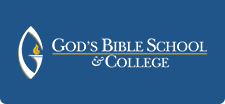Intercultural Studies & World Missions
Associates of Applied Science (AAS) – 2 year degree
Missions Cognate or Track within Bachelor of Arts (BA) – 4 year degree
Missions Minor accompanying Bachelor of Arts (BA) – 4 year degree
- Campus program
- Online program
Enhancing our Missions Program to Meet 21st Century Needs

From our start, GBSC has included a strong focus on global ministry — this is why our founder included “missionary training home” in our institutional name. Just as “missionary training home” is still part of our official name, we’re still passionate about missions and the global nature of our mission as a college.
That’s why we are excited for a new approach to missions education and training!
A New Approach
Over several years we have engaged in prayer, planning and discussion about how missions education can best be done today. Our discussions have included missionaries, missions educators and missionary leaders from conservative holiness denominations, Bible colleges and missions organizations, from Florida to Pennsylvania to Indiana and around the world.
Every single missionary and missions leader has agreed: a standalone “missions major” isn’t the answer.
In response, we have developed a different approach that provides missions education and training in numerous ways.
- A standalone 2-year missions degree, the AAS in Intercultural Studies and World Missions
- A missions minor available to every GBSC BA student, as well as all GBSC alumni with a bachelor’s degree
- A missions track that can be included in the Biblical and Theological Studies major or a missionscognate in the Integrative Studies major
- Opportunities for cross-cultural learning and service through short-term mission trips, missions conventions, the Intercultural Student Organization, and Engage Ministry Formation.
- Opportunities to learn through experience with six-week missions internships or the 12–24 week Study Abroad Program.
Combined, these approaches make missions training available to every single GBSC student!
GBSC Chancellor Michael Avery, himself a past missions leader, comments,
Taking the Gospel to the unreached people groups of today’s world holds enormous challenges — challenges that can and must be faced with new thinking, a variety of approaches and flexible training methods.
GBSC’s new approach to missionary training is a bold response to this daunting challenge.
A New Vision
Our vision includes graduates prepared for a range of vocations with a deep passion for and understanding of missions work. Success looks like…
- Long-term missionaries who use professional skills to open doors for missionary outreach
- Missionaries who serve a shorter period on the field and then bring their missions experience to US churches and ministries
- Pastors, teachers and others who knowledgeably support missions work and share their passion with others
- Laity who support missions organizations financially and with services
In addition to curriculum structures and learning opportunities that enable missions to permeate the college, we’ve also begun a Visiting Professor of Missiology program. Each year, we’ll bring a current or recent missionary or missions leader to campus multiple times for teaching, preaching and mentoring.
These visiting professors will connect our missions students directly with God’s frontline work in various fields, providing them with multiple perspectives on how mission work can be done.
Our Visiting Professor of Missiology
We are excited to have Dr. R. G. Hutchisonserving as our Visiting Professor of Missiology for 2022-2023.
An experienced missionary and pastor with a heart for people, Rev. Hutchison is now serving as Director for Bible Methodist Missions. During his missionary service in the Philippines from 2010-2022, he was involved in training Filipino pastors and leaders as a professor and academic dean at the Philippine Bible Methodist Shepherds College. Before that, he had served as a pastor for more than twelve years, ministering in Ohio and Tennessee.
In addition to being an alumnus of God’s Bible School and College (1998), R.G. also earned a Doctor of Ministry degree in preaching and leadership from Asbury Theological Seminary (2018), as well as graduate degrees from Temple Baptist Seminary (M.Div., 2009) and Asia-Pacific Nazarene Theological Seminary (M.S.T. Intercultural Studies, 2015). He is nearing completion of a Ph.D. in Intercultural Studies from Biola University.
Because of his extensive experience and education, Dr. Hutchison will bring an accomplished voice into the classroom. We’re privileged for him to join our faculty as Visiting Professor of MIssiology this year!
During this academic year, Dr.. Hutchison will teach missions courses with a blended schedule, connecting with students online and through multiple visits to campus each semester.
Past Visiting Professors of Missiology
- R.G. Hutchison – 2022-2023
- Tim Boyd – 2020-2021
- Steve Hight – 2020-2021
- Tim Boyd – 2019-2020
- Tim and Becky Keep – 2018-2019
- Steve Stetler – 2017-2018
Associates of Applied Science (AAS) – 2 year degree
Missions Cognate or Track within Bachelor of Arts (BA) – 4 year degree
Missions Minor accompanying Bachelor of Arts (BA) – 4 year degree
- Campus program
- Online program
Enhancing our Missions Program to Meet 21st Century Needs

From our start, GBSC has included a strong focus on global ministry — this is why our founder included “missionary training home” in our institutional name. Just as “missionary training home” is still part of our official name, we’re still passionate about missions and the global nature of our mission as a college.
That’s why we are excited for a new approach to missions education and training!
A New Approach
Over several years we have engaged in prayer, planning and discussion about how missions education can best be done today. Our discussions have included missionaries, missions educators and missionary leaders from conservative holiness denominations, Bible colleges and missions organizations, from Florida to Pennsylvania to Indiana and around the world.
Every single missionary and missions leader has agreed: a standalone “missions major” isn’t the answer.
In response, we have developed a different approach that provides missions education and training in numerous ways.
- A standalone 2-year missions degree, the AAS in Intercultural Studies and World Missions
- A missions minor available to every GBSC BA student, as well as all GBSC alumni with a bachelor’s degree
- A missions track that can be included in the Biblical and Theological Studies major or a missionscognate in the Integrative Studies major
- Opportunities for cross-cultural learning and service through short-term mission trips, missions conventions, the Intercultural Student Organization, and Engage Ministry Formation.
- Opportunities to learn through experience with six-week missions internships or the 12–24 week Study Abroad Program.
Combined, these approaches make missions training available to every single GBSC student!
GBSC Chancellor Michael Avery, himself a past missions leader, comments,
Taking the Gospel to the unreached people groups of today’s world holds enormous challenges — challenges that can and must be faced with new thinking, a variety of approaches and flexible training methods.
GBSC’s new approach to missionary training is a bold response to this daunting challenge.
A New Vision
Our vision includes graduates prepared for a range of vocations with a deep passion for and understanding of missions work. Success looks like…
- Long-term missionaries who use professional skills to open doors for missionary outreach
- Missionaries who serve a shorter period on the field and then bring their missions experience to US churches and ministries
- Pastors, teachers and others who knowledgeably support missions work and share their passion with others
- Laity who support missions organizations financially and with services
In addition to curriculum structures and learning opportunities that enable missions to permeate the college, we’ve also begun a Visiting Professor of Missiology program. Each year, we’ll bring a current or recent missionary or missions leader to campus multiple times for teaching, preaching and mentoring.
These visiting professors will connect our missions students directly with God’s frontline work in various fields, providing them with multiple perspectives on how mission work can be done.
Our Visiting Professor of Missiology
We are excited to have Dr. R. G. Hutchisonserving as our Visiting Professor of Missiology for 2022-2023.
An experienced missionary and pastor with a heart for people, Rev. Hutchison is now serving as Director for Bible Methodist Missions. During his missionary service in the Philippines from 2010-2022, he was involved in training Filipino pastors and leaders as a professor and academic dean at the Philippine Bible Methodist Shepherds College. Before that, he had served as a pastor for more than twelve years, ministering in Ohio and Tennessee.
In addition to being an alumnus of God’s Bible School and College (1998), R.G. also earned a Doctor of Ministry degree in preaching and leadership from Asbury Theological Seminary (2018), as well as graduate degrees from Temple Baptist Seminary (M.Div., 2009) and Asia-Pacific Nazarene Theological Seminary (M.S.T. Intercultural Studies, 2015). He is nearing completion of a Ph.D. in Intercultural Studies from Biola University.
Because of his extensive experience and education, Dr. Hutchison will bring an accomplished voice into the classroom. We’re privileged for him to join our faculty as Visiting Professor of MIssiology this year!
During this academic year, Dr.. Hutchison will teach missions courses with a blended schedule, connecting with students online and through multiple visits to campus each semester.
Past Visiting Professors of Missiology
- R.G. Hutchison – 2022-2023
- Tim Boyd – 2020-2021
- Steve Hight – 2020-2021
- Tim Boyd – 2019-2020
- Tim and Becky Keep – 2018-2019
- Steve Stetler – 2017-2018
Sample Classes
AAS
- Field Studies in Missions
- Cultural Diversity
- Principles & Problems of the Missionary Life
- World Religions
BA cognate/minor
- Cross-Cultural Communication
- Historical Foundation of Missions
- Current Issues & Methods of Missions
- Theology of the Christian World Mission
Why choose to study missions at GBSC?
The AAS in Intercultural Studies and World Missions is for lay people who may be interested in short-term missionary work or in working with missionary organizations or for those interested in pairing this degree with a professional degree.
The BA in Integrative Studies (Missions) prepares missionary candidates spiritually, academically, and practically for contemporary cross-cultural ministry abroad and at home, thus helping to fulfill the Great Commission. With the two eighteen-hours cognates in this degree, students complement their study of missions with a study of professional or practical skills that may be used on the mission field.
This degree allows you to customize a cognate from a variety of areas, including but not limited to:
- Counseling
- Teacher Education
- Ministerial Education
- Children’s Ministry
- Youth Ministry
- Business
- Music Education
- Teaching English as a Second Language
- Theological Education
With an eight-hour concentration in missions, the BA in Ministerial Education also prepares students spiritually and academically for cross-cultural ministry at home or abroad. In addition to learning biblical theology, students receive training in practical ministry, discipleship, evangelism, and preaching. Because of its focus, this program may be better suited for those intended to enter church planting or evangelistic cross-cultural ministry.
Graduates went off to be a
- missionary in Mexico
- English teacher in Mongolia and China
pastor in Northern Irelandleader of a Hispanic ministry in Indiana- inner-city mission church
- Christian school teacher in Guatemala
youth worker in Ukraine
AAS Program Requirements
Minimum Program Credits
60 credits
General Education: 19 – 26
Bible & Theology: 15
Program core: 26 – 31
Standard Completion Time
2 years
See more information in our Catalogs.
BA Cognate/Minor Program Requirements
Minimum Program Credits
18 credits
Complete additional BA requirements
Program hours: 18
Standard Completion Time
4 years
(as part of BA)
See more information in our Catalogs.
Accreditation
We are accredited by both the Higher Learning Commission (HLC) and the Association of Biblical Higher Education (ABHE). See why having both matters.

